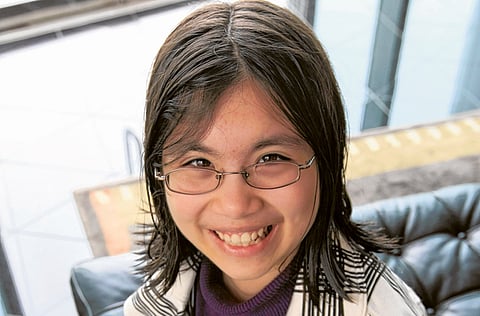The student becomes the teacher
Adora Svitak is living proof that pupils and tutors have much to learn from one another

At first glance, Adora Svitak, 13, appears to be like any other person on the cusp of adolescence. However, beneath the surface much sets her apart from her peers.
Svitak has been teaching since she was six-years-old, making her one of the world's first youngest teacher. It is her love of the written word, which made her share her passion with others.
"The idea there were kids out there who didn't love to read and write just as much as I did struck me," she told Gulf News during a visit to Dubai last week. "So I went around schools and tried to make other kids love to read and write."
She started writing when she was four-years-old and in no time had penned her first publication, Flying Fingers, as a writing guide for aspiring authors.
As she grew, Svitak developed a habit of reading three books a day and writing over 300,000 words a month. So how exactly does one read three books a day?
"Knowing a lot of vocabulary helps," she said. "They are reasonably sized books of 100 pages, but a lot of it I read quickly."
Leadership talk
Svitak first started teaching in her hometown of Seattle, US, but over the years has extended her reach across the globe through the use of video conferencing technology.
"I even once did video conferencing with Dubai, talking to students about leadership," she said. Svitak now even teaches teachers as she believes adults have much to learn from the young.
"I teach teachers why they should be getting involved with education and bringing technology into their classrooms," she said. "I share with them the voice of students on why they want social networking and blogging and such tools in their classrooms." Svitak believes it is innocence that gives young people the qualifications to teach adults from a fresh perspective.
"We always reference kids but very rarely ask their opinion," she said. "Our inexperience might be what gives us the ability to teach our elders something, due to the fact that we are not jaded or cynical."
Svitak classes herself as a writer first and foremost, but she is also a youth representative for the United Nation's World Food Programme.
In her role she advocates the cause of world hunger by educating her peers on how they can help end it.
Besides being a humanitarian, teacher and student, Svitak is also a public speaker and has the ability to inspire people across generations.
Naivety is positive
Svitak wowed her audience during a speech at Dubai Men's College (DMC) last week. She spoke at the 10th annual Education Without Borders Conference, hosted by the Higher Colleges of Technology.
"I found her tremendously powerful particularly because of her charisma which makes her an example for us adults," said Catalina Marin, a teacher at Abu Dhabi Women's College.
"She talked about three key things, one of which is to continue to be naïve and impulsive; because impulse should be the drive to achieve great things."
Svitak said she wanted to show people that adults' common derogatory terms for youths' was what made them special.
"A lot of negative words adults call the young, like naïve, impulsive and way too connected online, are all things we can turn into strengths to help us," she said. Her message to her youthful audience in Dubai was to take it as a compliment next time someone calls them naïve.
It was not Svitak's words alone that inspired but her mere stage presence.
"I'm 21-years-old and when I go to meetings I'm afraid to talk in front of people," said Mesha'al Al Marzouqi, vice-president of the student council at DMC. "When I saw Adora, a 13-year-old girl, talking in front of thousands, she gave me courage to speak in public."
Although she has been called many things, including the world's cleverest child and a child prodigy, Svitak remains humble and is aware she will grow up to be an adult one day.
"I think a lot of it is I applied my talents in writing," she said. "If we all understood we can learn from both older and younger people then we'd have a better world."


